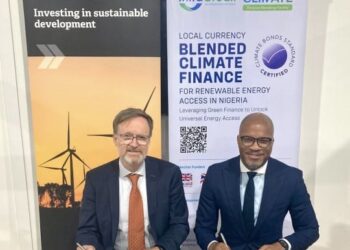The Federal Government of Nigeria has targeted some private sector players such as Sun Africa, InfraCredit, African Incentive Partnerships, the Rural Electrification Agency (REA) and others, towards meeting its energy transition plan.
Nairametrics gathered that Nigeria’s Energy Transition Office recently met with the private sector players to share views on how to move the energy transition plan forward.
Their response to FG: Speaking during the roundtable, the Chief Executive Officer of InfraCredit Chinua Azubuike, said the private sector has a responsibility to bridge the gap between the perception of risk and what is real. He expressed his belief that grants can be catalytic when applied.
On funding, the Managing Director of the Rural Electrification Agency (REA), Mohammed Salihijo acknowledged the role of the private sector in mobilizing funding across generation, transmission, and distribution systems of Nigeria’s power sector.
Meanwhile, the Managing Director of Sun Africa, Hakeem Shagaya, said power should be generated where it is consumed.
The private sector’s role: Before the roundtable, the Head of the Energy Transition Office, Dr Muntaqa Umar-Sadiq told Arise TV that the energy transition plan is forward-looking. He added that the work to build that reality should happen sooner than later, to benefit Nigerians in the areas of job creation, environmental sustainability and energy security.
While addressing financing for the energy transition plan which requires $10 billion every year till 2030, Muntaqa said the private sector has a role to play in setting up financing models to aid the realization of set goals. He said:
- “We have spent some time curating a pipeline of proven projects, both on and off-grid across the value chain, from gas flare commercialization projects to interconnected mini-grid projects to liquefied petroleum gas (LPG) projects, creating an opportunity to develop synergies between the needs of these projects and the capabilities/capital of the private sector.
- “The round table is around aligning private sector investment portfolio to these energy transition efforts on one hand and also establishing a private sector working group that continues to provide stewardship required to finance and implement the energy transition plan.”
What you should know: Nigeria’s energy transition plan will need $410 billion for implementation across the country. The Nigeria Energy Transition Plan (ETP) is a home-grown, data-backed, multipronged strategy developed for the achievement of net-zero emissions in terms of the nation’s energy consumption.
The ETP sets out a timeline and framework for the attainment of emissions reduction across 5 key sectors; Power, Cooking, Oil and Gas, Transport and Industry.
Nigeria’s net-zero pathway will result in significant net job creation with up to 340,000 jobs created by 2030 and up to 840,000 jobs created by 2060 driven mainly by the power, cooking and transport sectors.
The energy transition office lists the following key objectives as follows:
- Lifting 100 million Nigerians out of poverty and driving economic growth
- Bringing modern energy services to the full population
- Managing the expected long-term job loss in the oil sector due to the reduced global fossil-fuel demand
- Playing a leadership role for Africa by promoting a fair, inclusive and equitable energy transition in Africa that will include Gas as a “transitionary fuel”
- Streamlining existing and new government-related energy transition initiatives























